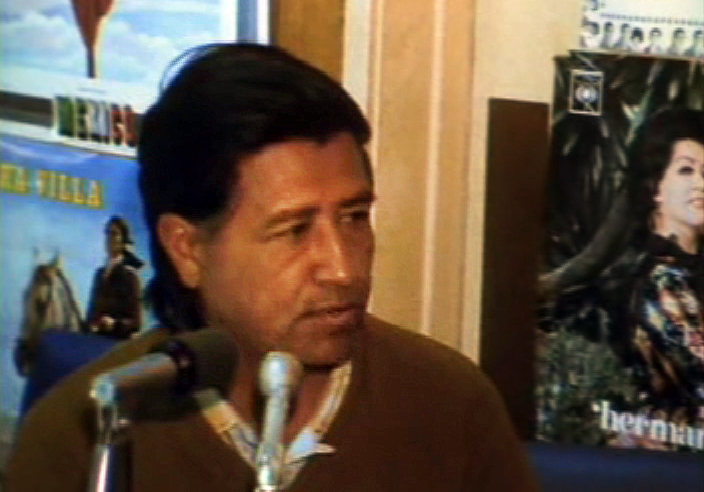Billy Wilder symposium to showcase orphan films

A KTLA news film of a César Chávez press conference is just one of the orphan films that will screen at the eighth biennial Orphan Film Symposium.
CREDIT:UCLA FILM & TELEVISION ARCHIVE
By Brittany Taylor
May 11, 2011 1:47 a.m.
Correction: The original version of this article contained several errors. UCLA is hosting “Celebrating Orphan Films” in anticipation of the eighth biennial Orphan Film Symposium in New York. The project “And Then They Forgot God,” was written and directed by the late Sy Salkowitz and will be presented by Mark Quigley and journalist Paul Cullum.
When you hear the word “orphan,” you most likely think of Annie, Oliver Twist or Harry Potter. But the UCLA Film & Television Archive sees the word as a rare film it wants to acquire.
In anticipation of the eighth biennial Orphan Film Symposium in New York, UCLA is hosting “Celebrating Orphan Films” this Friday and Saturday in the Billy Wilder Theater, presenting screenings of films on the subject and holding discussions on topics such as the technology used to save the material.
After founding the symposium at the University of South Carolina in 1999, Dan Streible joined New York University in 2006 as a professor of cinema studies. This year, the NYU Orphan Film Project presents the symposium with the UCLA Film & Television Archive. Streible said the term “orphan” has two definitions.
“The more narrow definition is a film that was hidden or abandoned by a rights owner, or perhaps the owner is not identified. In the past they wouldn’t preserve the material, because they didn’t know who might come forth and claim it. Hence, it became called orphan,” Streible said.
The broader definition of an orphan film, he said, refers to all film material that is outside of the commercial mainstream. This can include student works, home movies, outtakes, newsreels and censored material.
This year’s symposium will include a LGBT activist film that was shot without permission at Disneyland; home videos of Marie Dickerson Coker, one of the first female black pilots; and raw footage of New York City in 1929.
Many of these films are acquired through private collections donated by families, television companies that have gone out of business and motion picture laboratories. Each film presents aspects of culture that may not be represented in mainstream movies.
Jan-Christopher Horak, director of the UCLA Film & Television Archive, said orphan films are a way to look at how people behaved and dressed through the years. The films tend to show up in documentaries to add visual clarification to an idea presented in the film.
“Often they are films that were shot off of 16 mm, which usually had a relatively short life. A lot of documentaries use this type of historical footage to visualize their point,” Horak said.
Streible said that when the Orphan Film Symposium started, it attracted archivists, filmmakers and supporters interested in preserving these films.
“For whatever reason, the chemistry between all of those groups seemed to work very well,” Streible said. “It’s been a year-round effort to collaborate between schools, archives, film laboratories and people in general who advocate toward the efforts to rediscover orphan films.”
Mark Quigley, manager of the Archive Research and Study Center at UCLA, said the event will present films that display a wide and entertaining overview of the types of orphan films that exist.
Alexander Prisadsky’s movie “Five Situations for Camera, Recorder and People” is a student project that was made with the help of Jim Morrison, the lead singer of The Doors, as the sound man. The student work, which qualifies as an orphan because it is a piece of student work outside of the commercial mainstream, includes shots of UCLA during the ’60s as well as footage of an actual March Madness celebration during the time.
Quigley and journalist Paul Cullum will present a project called “And Then They Forgot God” by the late writer and director Sy Salkowitz. Quigley said the movie takes place in a futuristic society where everyone is concerned with rules rather than humanity.
The educational movie was made around the same time the Nixon administration was looking at how to make social welfare more cost-effective.
“(The movie) was done for educational distribution. … It’s almost like a “˜Twilight Zone’ episode … but has a plot twist that is darker than any “˜Twilight Zone’ episode,” Quigley said.
He explained that the preservation of these works allows us a glimpse into the past from the view of everyday people.
“There is more to cinema history than commercial Hollywood films,” Quigley said. “There is a lot of cultural and social history embedded in these films. We learn a lot about ourselves from looking at this material beyond Hollywood representations.”


